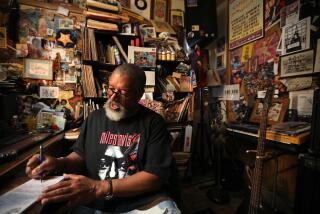Mailer, 80, hasn’t lost his bite
- Share via
Reverence, Norman Mailer said Monday night, “is not one of my favorite words.” But that’s the way the audience of about 550 at the Skirball Cultural Center treated the pugnacious writer -- like an Old Testament prophet, too long in exile, returning to his people. Even the mention of his 80th birthday drew a hearty round of applause. The genial Westside crowd paid rapt attention to his every sentence, refusing to allow anyone to get in the way of the wise man delivering the Word.
The event, part of the Writers Bloc literary series that has included such notables as A.S. Byatt and James Ellroy, was conceived as an interview by poet Carol Muske-Dukes. But a few minutes into the conversation, which was marked by long questions from the poet and brief answers from the author, things turned ugly. “Can we have more of Mr. Mailer and less of you?” a man with a New York accent shouted, to applause.
“I must say,” Mailer said, keeping the peace in his rumbling, almost seismic voice, “these questions are excellent.” It was a quick burst of aggression in an evening that could’ve used a little more.
The author, after all, is the man who made American literature a contact sport. At times, Mailer’s work has been overshadowed by his feuds, his head-butting, his baiting of feminists, his stabbing of one of his wives and his helping to free a killer who killed again. But at the Skirball, it was all business.
The author’s birthday last month and the simultaneous publication of “The Spooky Art: Some Thoughts on Writing” is prompting a reassessment of his body of work. “He’s changed the face of American prose,” Ron Rosenbaum wrote this month in the New York Observer. “He made it possible to write about two very big things, in a way they’d never been written about in the first person: Sex and Ideas.” The Times of London judged, in contrast, that “he has had a more lasting influence on bad writers than on good ones.”
But Mailer’s sprawling career, with its enormous highs and deep lows, the violence and obsessions with masculinity, were mostly dodged Monday night.
Because the conversation revolved almost entirely on his new book, and roughly half of the audience’s questions were seeking career advice, the focus was more on literary technique and favorite-author chatter than convulsions of the age.
What does Mailer, looking back over six decades, make of his own reputation and output? What does he make of Los Angeles, which he once wrote looks like “it was built by television sets giving orders to men?” He was never asked. And while he’s one of the great commentators on politics -- starting with his invigorating 1960 essay on the Democrats and JFK, “Superman Comes to the Supermarket” -- he offered only a few glib knocks at President Bush.
When Mailer let rip on his own tangents, or responded with quick wit to audience questions, out came the young man, equal parts pugilist and philosopher, who roared out of Harvard with the 1948 World War II novel “The Naked and the Dead.” There were other intriguing moments -- when Mailer mentioned his admiration for Madonna and her videos and for early “Twin Peaks” and his disdain for almost everything else in pop culture, especially bestsellers.
“Books that are plot-driven are, to my mind, heinous,” he said.
The six-time-married author described his affinity to Picasso: “Every time he had a new wife or a new mistress, his style would change.” The short, white-haired octogenarian told a winning anecdote about his interest in being reincarnated as “a black athlete.” And Virginia Woolf’s style sets his “teeth on edge,” he said. “She’s much too satisfied with the smell of her own armpit.”
After the conversation, the crowd politely queued up to have books signed, and Mailer, his stature more evident offstage, made for the men’s room. As he struggled up the flight of stairs with his two canes, a man asked Mailer if he’d like assistance. The author returned a brusque “No!”
No one was going to treat this enfant terrible -- for all his newfound mildness, his politeness before the crowd -- like an old man.
More to Read
Sign up for our Book Club newsletter
Get the latest news, events and more from the Los Angeles Times Book Club, and help us get L.A. reading and talking.
You may occasionally receive promotional content from the Los Angeles Times.










